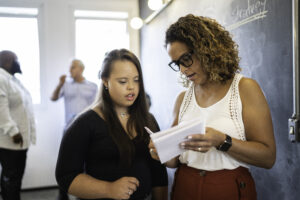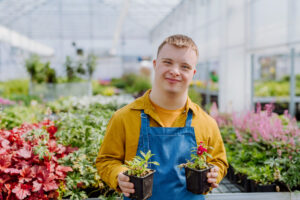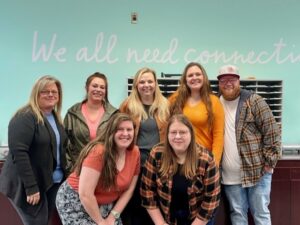Supporting People with Developmental Disabilities
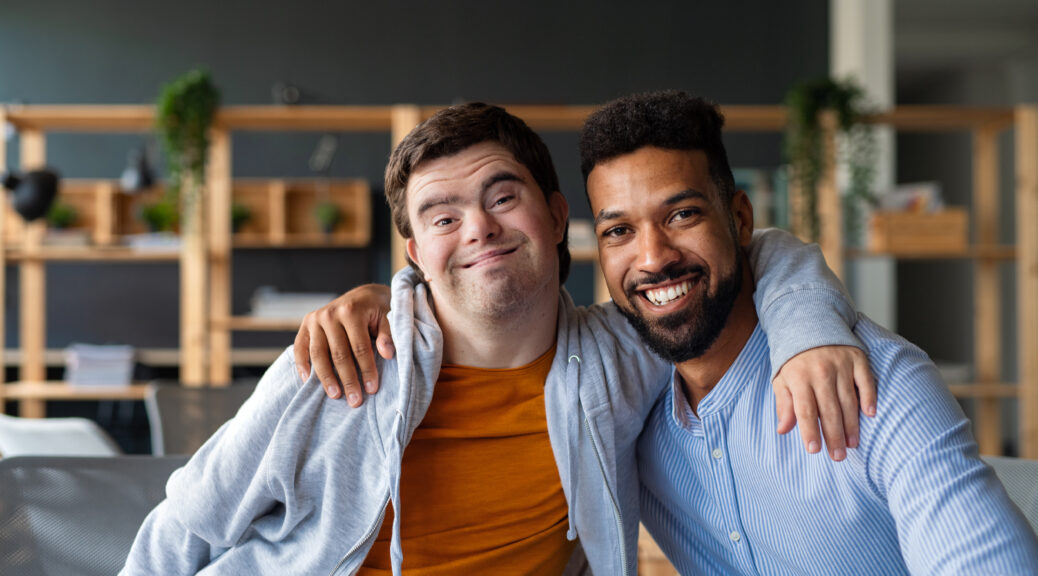
March is Developmental Disabilities Awareness Month. Community support and programs designed to empower individuals with developmental disabilities go a long way toward greater awareness, independence and inclusivity — and there’s a lot you can do too. From our work at KVC Nebraska, to opportunities you may have in your everyday life, discover strategies to support people with developmental disabilities in your community.
What are Developmental Disabilities?
The CDC defines developmental disabilities as “a group of conditions due to an impairment in physical, learning, language or behavior areas.” Developmental disabilities begin during childhood (the developmental period) and manifest as physical, learning, language or behavioral impairments. Some developmental disabilities, such as Down Syndrome, can be diagnosed at birth or even in utero, whereas others may not be identifiable until later in life, like Autism. Developmental disabilities may occur due to an accident or injury, like a traumatic brain injury (TBI), and usually last throughout a person’s lifetime.
About 1 in 6 children in the U.S. have one or more developmental disabilities. Some common developmental disabilities include sensory processing disorders, developmental delays, learning disabilities and metabolic developmental disabilities.
For individuals living with developmental disabilities, the level of independence can vary from complete autonomy to needing full-time care. But we can all do our part to support those with developmental disabilities in our community, regardless of their capabilities.
How to Be More Inclusive in Your Personal Life
Becoming more supportive often starts with increasing our own awareness and education. To that end, avoid relying on assumptions and stereotypes, and instead make an effort to educate yourself on different disabilities. Keep in mind that disabilities may present differently in every individual and each person has unique needs.
In addition to educating yourself about disabilities themselves, it can be helpful to educate yourself about your community’s resources for people with disabilities. This helps to build your support toolkit as you aim to help your neighbors.
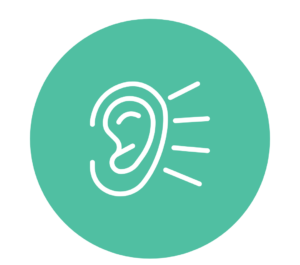 Listen with compassion. Listen to the stories of those affected by developmental disabilities. Be compassionate and open to learning about their interests and opinions. And before providing assistance or jumping into a situation, always ask.
Listen with compassion. Listen to the stories of those affected by developmental disabilities. Be compassionate and open to learning about their interests and opinions. And before providing assistance or jumping into a situation, always ask.
In communication, take care to use people-first language. Avoid terms and phrases that could be harmful or disrespectful to those with developmental disabilities. People-first language means seeing people with disabilities as people first and foremost! Anyone with a disability is much more than the condition that impacts their everyday life.
Six Ways to Support Someone with a Developmental Disability
Even if you don’t have a close friend or family member with a developmental disability, you can do your part to be supportive, educate yourself and make our communities more accessible to and welcoming for everyone. Here are six practical ways to make a difference:
1. Provide Employment Opportunities
One significant barrier to gaining full independence for those with developmental disabilities is finding employment. People with disabilities are significantly underrepresented in employment, particularly in management positions. But it’s an important step towards creating more inclusive workplaces. Brainstorm positions that could be ideal for those with disabilities and make an effort to hire with an inclusive perspective.
2. Provide Respite Care
Respite care services provide temporary care for individuals with developmental disabilities. Providing respite care can be a truly meaningful way to support families! Primary caregivers of people with disabilities need assistance when they have to step away from time to time, whether for self-care, emergencies or otherwise. Getting certified to provide respite care can help not only individuals with disabilities, but their families too.
3. Help with Day-to-Day Tasks
Sometimes, the little things make a big impact. Offer to help by running errands for individuals with developmental disabilities and their caregivers, or assisting with chores around the home — or, if it’s feasible, accompany the person with a disability on errands or work together on chores. This assistance can both allow primary caregivers more time in their day and empower those with disabilities to accomplish their daily activities.
4. Make a Donation
 Consider making a meaningful gift to organizations providing care and support to those who need it. If you are interested in supporting KVC Nebraska’s work of helping children and families in crisis, you can donate through one-time or monthly giving. You can also make a generous difference by attending fundraising events, or even donating hygiene items, school supplies and holiday gifts for families.
Consider making a meaningful gift to organizations providing care and support to those who need it. If you are interested in supporting KVC Nebraska’s work of helping children and families in crisis, you can donate through one-time or monthly giving. You can also make a generous difference by attending fundraising events, or even donating hygiene items, school supplies and holiday gifts for families.
5. Share Your Skills
Think about where your talents lie, and find ways to share those with others! This could be through volunteering, mentoring or teaching unique skills to those in your community with disabilities. You might consider building mentor-to-mentee relationships through organizations you’re already involved in, like schools, places of worship or neighborhood associations.
6. Become a Shared Living Provider
Shared Living Providers offer individuals with developmental disabilities 24/7 social and independent living skills support in a family setting — and anyone 21 years of age or older with access to reliable transportation can become one! Living providers open their homes to people with disabilities who are looking for a comfortable place to call home, where they can build essential life skills while forming beneficial relationships.
The Benefits of Shared Living with KVC
Shared Living providers are among the most valuable resources in the lives of individuals with developmental disabilities. Shared Living providers with KVC Nebraska are both direct caregivers and teachers, helping individuals with developmental disabilities learn how to live as independently as possible with a robust family support system.
Shared Living helps individuals with developmental disabilities by:
- Helping them develop important life skills
- Increasing their self-esteem
- Expanding activities to enhance life and help them find new interests
- Expanding social circles and informal support systems
Interested in Becoming a Shared Living Provider?
Curious about what it takes to become a Shared Living Provider? Requirements to become a Shared Living Provider include:
- Must be 21 years of age or older
- Have a valid driver’s license and/or reliable transportation
- Willing for everyone in your household to undergo complete background checks
- Complete KVC’s Shared Living training (including CPR/First Aid, MANDT and Medication Aide)
- Meet all applicable Department of Health and Human Services regulations
With KVC, you won’t be going it alone. KVC Shared Living Providers receive a designated Shared Living Specialist to provide 24/7 support and direction and on-time monthly reimbursement payments, as well as ongoing training and support.
Start the application process to become a Shared Living provider with KVC Nebraska, and get connected to one of our team members!

